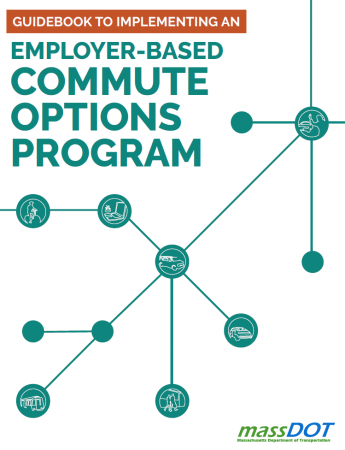ACTIONS
- Protect and safeguard cultural and natural heritage
- Learning and educational opportunities
- Cultural participation/social inclusion
- Sustainable tourism
- Support research
- Employment (recruiting, training, safety)
- Energy consumption, greenhouse gas emissions
- Waste management and reduction
- Transport (forms of, energy use)
- Commercial activities including copyright and IP
- Governance and management
- Security, disaster preparedness, risk reduction
- External partnerships and collaborations
- Toolkit/framework/roadmap
- Case studies
Guidebook to Implementing an Employer-based Commute Options Program

Intended Audience
Employers interested in developing and implementing sustainable travel options for employees.
- Massachusetts Department of Transport
“An employer-based commute options program describes a voluntary program aimed at improving employees’ commutes while saving money, improving employee satisfaction, recruitment and retention, and reducing environmental impact.
Programs often include a variety of commute options strategies that are tailored towards each organization. Examples include infrastructure that enables an active commute, such as bike racks, and benefits that reduce employee commute expenses.
This guidebook was created to assist employers of all sizes and across Massachusetts to develop and implement commute options programs that address the needs of their employees and make business sense.”
Avaiable in
- English
SDGs LINKAGES
The resource can help support a number of SDG targets around sustainable travel, including:
SDG 11.2 (support sustainable travel), 3.4 (mental health and wellbeing), 9.1 (develop infrastructure that supports sustainable development), 12.6 (adopt sustainable practices), 12.7 (sustainable procurement), 13.3 (improving individual and institutional capacity for climate action) and 16.B (promote laws and policies for sustainable development. Many of the actions could also support sustainable transport by the public, supporting SDG 11.7 (safe and welcoming green and public places).
Click on the SDG Target to discover Our Collections Matter indicators
-
Our Collections Matter indicators:
- Plans, policies and procedures in place for the safe use of collections, notably in relation to chemical, physical, biological and other forms of hazard.
- Proportion of users of collections facilities reporting positive well-being during and as a result of activities relating to collections.
- Number and proportion of programmes relating to collections that incorporate wellbeing considerations and perspectives.
- Number of targeted programmes drawing on collections that address issues relating to non-communicable diseases, supporting prevention and treatment.
-
Our Collections Matter indicators:
- Development of research-useful collections to support reliable, sustainable and resilient use by researchers and others.
- Number and proportion of collections facilities and stores that support economic development and human well-being.
- Number and proportion of collections facilities and stores that provide affordable and equitable access for all.
- Investment in collections facilities.
- Inclusion of collections information in regional and transborder initiatives, notably via digital access for discoverability.
-
Our Collections Matter indicators:
- Numbers of people accessing collecting institutions from different demographic groups, notably women, children, older people and persons with disabilities.
- Increases in numbers of people accessing collecting institutions from different demographic groups.
- Measures taken to remove barriers to access green and public spaces.
- Extent of green space provided by collections institutions.
-
Our Collections Matter indicators:
- Clear visions, strategies and plans in place for all aspects of sustainability – environmental, social and economic (people, planet, prosperity)- across all areas of activity.
- Visions, strategies and plans relating to sustainability to be publicly available and incorporated into planning documents.
- Commitments to be in line with local, regional, national and/or international targets and ambitions.
- Incorporation of sustainability into reporting for funders and other stakeholders, including the public. Reporting to include commitments and progress towards targets.
-
Our Collections Matter indicators:
- Incorporation of sustainability considerations into procurement, in terms of advertisement and invitation to tender, contracts, and selection criteria for suppliers.
-
Our Collections Matter indicators:
- Plans in place to enhance positive contributions to addressing climate change through use of collections. Plans in place to ensure collections, collections institutions and broader society can adapt effectively to climate change.
- Plans in place for effective education and awareness raising on climate change mitigation, adaptation, impact reduction and early warning.
- Plans in place to reduce negative contributions of collections-related functions, e.g. measuring greenhouse emissions with plans and targets in place to reduce them.
-
Our Collections Matter indicators:
- Proportion of population [audience/users/non-users] reporting having personally felt discriminated against or harassed in the previous 12 months on the basis of a ground of discrimination prohibited under international human rights law.
- Number and proportion of policies that incorporate sustainable development considerations, in the full sense of recognizing all three of social, economic and environmental considerations.
-
Our Collections Matter indicators:
- Plans in place to ensure safe, affordable, accessible and sustainable transport systems for all, in terms of accessing collections-based institutions.
- Plans in place to use collections-based institutions to provide education and awareness of public transport systems and their development.
- Special attention to those in vulnerable situations, including women, children, disabled and older people, taken in plans regarding public tansport.
